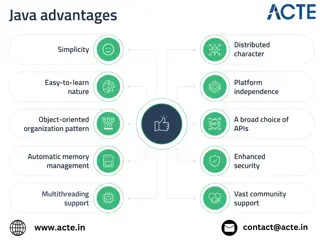Understanding Generics in Java
Generics in Java allow for parameterized types, enabling the use of different data types in classes, interfaces, and methods. By creating generic entities, such as classes that work with various data types, Java programmers can write more flexible and reusable code. This concept is demonstrated through examples of creating generic classes and methods in Java.
Download Presentation

Please find below an Image/Link to download the presentation.
The content on the website is provided AS IS for your information and personal use only. It may not be sold, licensed, or shared on other websites without obtaining consent from the author. Download presentation by click this link. If you encounter any issues during the download, it is possible that the publisher has removed the file from their server.
E N D
Presentation Transcript
Generics means parameterized types. The idea is to allow type (Integer, String, etc, and user-defined types) to be a parameter to methods, classes, and interfaces. Using Generics, it is possible to create classes that work with different data types. An entity such as class, interface, or method that operates on a parameterized type is called generic entity.
Generic Class Like C++, we use <> to specify parameter types in generic class creation. To create objects of generic class, we use following syntax. // To create an instance of generic class BaseType <Type> obj = new BaseType <Type>() Note: In Parameter type we can not use primitives like 'int','char' or 'double'.
// A Simple Java program to show working of user defined // Generic classes class Test<T> { T obj; Test(T obj) { this.obj = obj; } public T getObject() { return this.obj; } } class Main { public static void main (String[] args) { // instance of Integer type Test <Integer> obj = new Test<Integer>(15); System.out.println(obj.getObject()); // instance of String type Test <String> sObj = new Test<String>( Hello"); System.out.println(sObj.getObject()); } }
We can also pass multiple Type parameters in Generic classes. class Test<T, U> { T obj1; // An object of type T U obj2; // An object of type U class Main { // constructor Test(T obj1, U obj2) { public static void main (String[] args) { Test <String, Integer> obj =new Test<String, Integer>( Hello", 15); obj.print(); } } this.obj1 = obj1; this.obj2 = obj2; } // To print objects of T and U public void print() { System.out.println(obj1); System.out.println(obj2); } }
Generic Functions: We can also write generic functions that can be called with different types of arguments based on the type of arguments passed to generic method, the compiler handles each method.
// A Simple Java program to show working of user defined // Generic functions class Test { static <T> void genericDisplay (T element) { System.out.println(element.getClass().getName() +" = " + element); } public static void main(String[] args) { // Calling generic method with Integer argument genericDisplay(11); // Calling generic method with String argument genericDisplay( Hello"); // Calling generic method with double argument genericDisplay(1.0); Output java.lang.Integer = 11 java.lang.String = Hello java.lang.Double = 1.0 } }
Programming Exercise Write a program to create a generic method which will allow us to swap object two Integers, two Floats and Two Characters wrapper classes.
Generics work only with Reference Types: When we declare an instance of generic type, the type argument passed to the type parameter must be a reference type. We cannot use primitive data types like int,char.., Test<int> obj = new Test<int>(20); The above line results in a compile-time error, that can be resolved by using type wrappers to encapsulate a primitive type.
Generics Types Differ Based on Their Type Arguments: // A Simple Java program to show working // of user-defined Generic classes // We use < > to specify Parameter type class Test<T> { // An object of type T is declared T obj; Test(T obj) { this.obj = obj; } // constructor public T getObject() { return this.obj; } } error: incompatible types: Test cannot be converted to Test // Driver class to test above class Main { public static void main (String[] args) { // instance of Integer type Test <Integer> iObj = new Test<Integer>(15); System.out.println(iObj.getObject()); } } // instance of String type Test <String> sObj =new Test<String>("GeeksForGeeks"); System.out.println(sObj.getObject()); iObj = sObj; //This results an error
Even though iObj and sObj are of type Test, they are the references to different types because their type parameters differ. Generics add type safety through this and prevent errors.
Advantages of Generics: 1. Code Reuse: We can write a method/class/interface once and use for any type we want. Type Safety : Generics make errors to appear compile time than at run time (It s always better to know problems in your code at compile time rather than making your code fail at run time). Suppose you want to create an ArrayList that store name of students and if by mistake programmer adds an integer object instead of string, compiler allows it. But, when we retrieve this data from ArrayList, it causes problems at runtime. Consider example on next slide 2.
// A Simple Java program to demonstrate that NOT using // generics can cause run time exceptions import java.util.*; class Test { public static void main(String[] args) { // Creatinga an ArrayList without any type specified ArrayList al = new ArrayList(); al.add("Sachin"); al.add("Rahul"); al.add(10); // Compiler allows this String s1 = (String)al.get(0); String s2 = (String)al.get(1); } Program will throw runtime exception Exception in thread "main" java.lang.ClassCastException: java.lang.Integer cannot be cast to java.lang.String at Main.main(Main.java:17) } // Causes Runtime Exception String s3 = (String)al.get(2);
How generics solve this problem? At the time of defining ArrayList, we can specify that this list can take only String objects. // Using generics converts run time exceptions into // compile time exception. import java.util.*; class Test { public static void main(String[] args) { // Creating a an ArrayList with String specified ArrayList <String> al = new ArrayList<String> (); al.add("Sachin"); al.add("Rahul"); // Now Compiler doesn't allow this //al.add(10); } } String s1 = (String)al.get(0); String s2 = (String)al.get(1); String s3 = (String)al.get(2);
3. Implementing generic algorithms: By using generics, we can implement algorithms that work on different types of objects and at the same they are type safe too.























